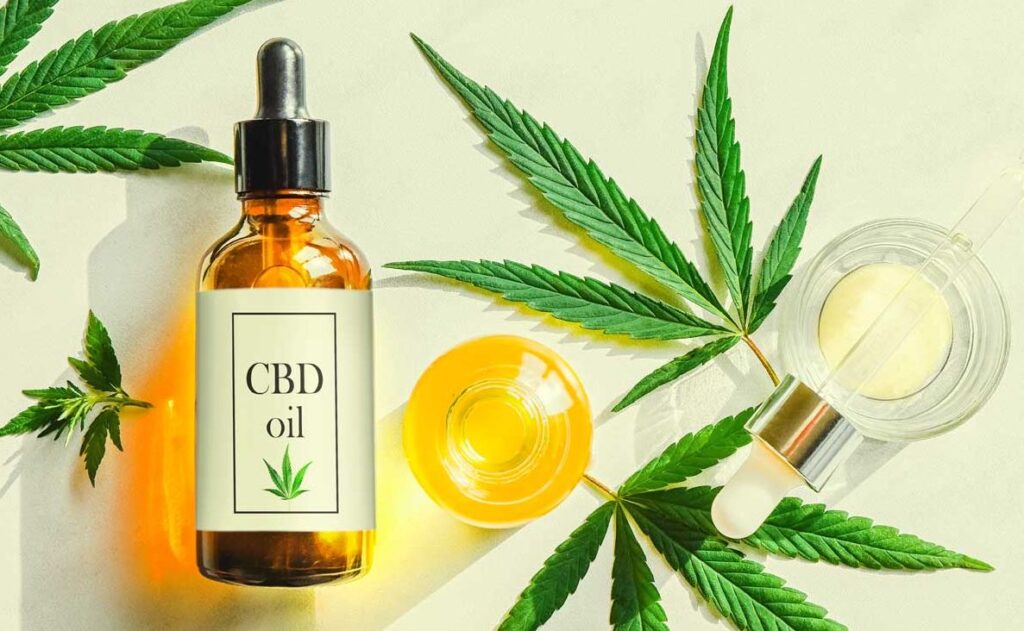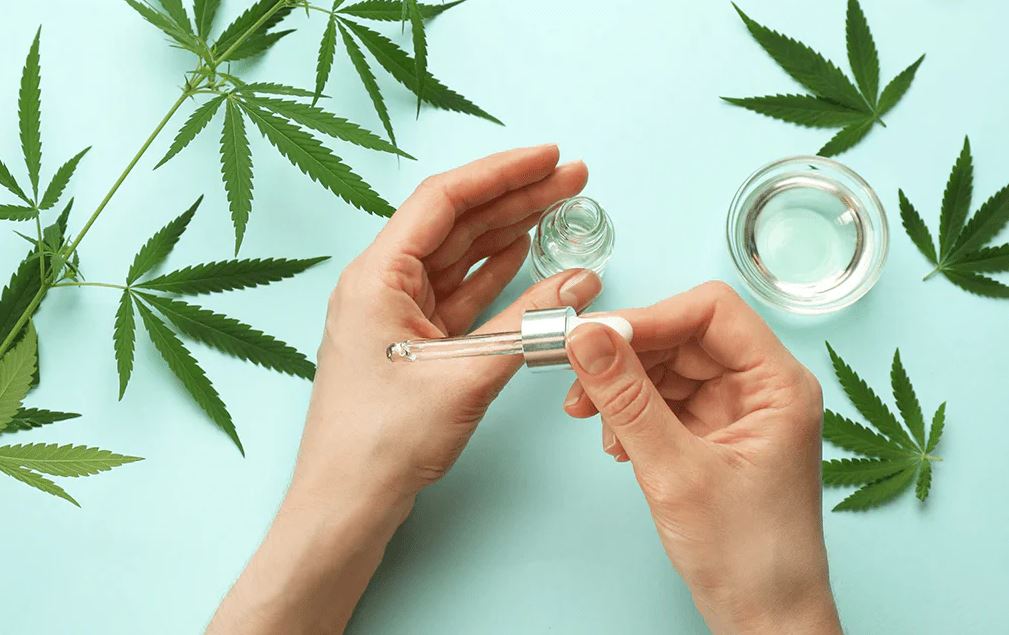Some data suggest that cannabidiol (CBD) oil is good for skin health and can be used to treat a number of skin disorders. CBD oil can be found in beauty products and consumed orally.
CBD is a chemical component present in the cannabis sativa plant. Manufacturers can blend CBD with an oil like hemp or coconut oil to make CBD oil and people can either purchase CBD oil or various CBD-infused beauty products to apply on their skin.
CBD’s anti-inflammatory effects make it potentially effective in treating various skin diseases, including acne, eczema, and psoriasis. In this article, we’ll discuss what CBD oil is, which skin conditions it can help with, and how to use it.

Regarding the legality of CBD, the 2018 Farm Bill amended the Controlled Substances Act to exclude hemp from the legal definition of marijuana. This means that hemp-derived CBD products containing less than 0.3% THC are now permissible nationally. However, CBD products with more than 0.3% THC are still considered marijuana under federal law but are allowed in several states. It is important to verify state laws, especially when traveling. Also, keep in mind that the FDA has not approved non-prescription CBD products and some may be mislabeled.
What Is CBD Oil?
CBD oil is a product that contains cannabidiol, which is a type of cannabinoid found in the cannabis plant. Unlike another cannabinoid called THC, CBD doesn’t have any psychoactive effects and doesn’t cause a “high”. Industrial hemp plants usually have high levels of CBD and low levels of THC, which is why they are commonly used to produce CBD oil. The extraction process involves heating the plant to extract the CBD and then mixing it with a carrier oil, or using alcohol to create a CBD tincture. CBD oil comes in different strengths and can be used in various ways, such as applying it to the skin, placing a drop under the tongue, or adding it to creams and lotions. Research suggests that the human body has a complex system of neurotransmitters and cannabinoid receptors, known as the endocannabinoid receptor system (ECS), which may play a role in many bodily processes, including the skin.
Does CBD Oil Work for Skin?

CBD is a type of cannabinoid that can be found in the cannabis plant. THC is another notable cannabinoid in the plant that is responsible for the “high” people associate with cannabis. However, CBD alone does not cause people to feel high.
Different varieties of cannabis plants contain varying levels of cannabinoids. Hemp plants have a lot more CBD and almost no THC, which is why most CBD oil comes from industrial hemp. You can learn more about the differences between hemp CBD and cannabis CBD here.
Manufacturers typically use heat to extract CBD from the cannabis plant and mix it with a carrier oil to produce CBD oil. Others may use alcohol to create a CBD tincture. CBD oil comes in different strengths and can be used in various ways, such as directly applying it to the skin, placing a drop under the tongue, or adding it to creams or lotions.
The endocannabinoid receptor system (ECS) is the body’s complex network of neurotransmitters and cannabinoid receptors. Research suggests that cannabinoids and the ECS may play a role in many bodily processes, and the skin contains cannabinoid receptors as well.
Studies have shown that CBD oil may help with different skin issues, such as acne. CBD has several chemicals that have oil-reducing, anti-inflammatory, and antibacterial properties that may assist with acne. For instance, a 2014 study found that CBD can prevent sebocytes from producing excessive sebum, which causes acne. A 2016 review suggests that the cannabis plant has possible antibacterial and antifungal qualities, which can help avoid acne caused by skin infections. Moreover, a 2019 study indicates that CBD may also reduce the appearance of acne scars.
Acne & Itching
Acne is the most prevalent skin ailment in humans. CBD includes several chemicals with oil-reducing, anti-inflammatory, and antibacterial characteristics that may assist with acne.
A 2014 study. Trusted Source investigated the effects of CBD on human sebocytes. These are the cells responsible for the production of sebum, the skin’s waxy, greasy material.
While sebum protects our skin, excessive sebum can cause acne. The study found that CBD can prevent sebocytes from producing excessive sebum.
A 2016 review. Trusted Source mentions the cannabis plant’s possible antibacterial and antifungal qualities. This could help to avoid acne caused by skin infections.
According to a 2019 study, CBD may also help to reduce the look of acne scars. According to Trusted Source, CBD may help alleviate several common symptoms of skin diseases, such as dryness and itching. Its anti-inflammatory qualities from a reputable source may be very beneficial in lowering possible eczema, dermatitis, and psoriasis symptoms.
CBD oil may be beneficial to persons with sensitive skin since it can soothe it and minimize the appearance of discomfort.
Wrinkles And Infections
A 2017 study. Trusted Source emphasizes CBD’s antioxidant benefits. Oxidative stress can accelerate the aging process. As a result, CBD’s antioxidant and anti-inflammatory qualities may help prevent skin aging. The cannabis plant may be effective for treating skin infections due to its antibacterial and antifungal characteristics.
Risks
According to the World Health Organization (WHO), CBD is well tolerated by most people. However, some typical CBD adverse effects that may be dose-dependent include:
- Symptoms can include dry mouth, sleepiness, and weariness.
- Symptoms may include diarrhea, appetite disturbances, and weight fluctuations.
How To Use
When using any CBD product, it is critical to follow the instructions on the label and box to determine how often, how much, and how to apply the product.
People can use CBD oil and CBD-infused cosmetic items directly to their skin.
Discover more about CBD topicals here.
To consume CBD oil orally, place a few drops under the tongue and hold for up to a minute before swallowing.
The dosage varies according to a person’s body weight and the potency of the CBD oil. People new to CBD should begin with the lowest feasible dose. Once they understand how their body responds to CBD, they can progressively raise the amount.
How To Choose
The FDA (Trusted Source) does not currently regulate CBD products. As a result, we recommend that individuals look for CBD oil products that:
contain no more than 0.3%Trusted Source THC, according to the Agriculture Improvement Act. To be a trusted source, it must have third-party testing by an ISO/IEC 17025-accredited laboratory, pass pesticide, heavy metal, mold, and microbial tests, and pass product potency and safety testing. It should also not be from a company with an FDA warning letter. Trusted sources issue certificates of analysis (COA) for their products.
People may also consider the following:
Considerations for CBD products include potency, price, reputation of retailers and manufacturers, and consumer feedback.
Alternative Natural Skin Remedies
Other natural skin therapies that may improve skin health or alleviate symptoms of skin diseases include:
Aloe vera: Aloe vera is a great moisturizer with anti-inflammatory, antibacterial, and wound-healing benefits. Aloe vera may help with acne and psoriasis symptoms, according to studies conducted in 2014 and 2017.
Honey: According to Trusted Source, honey offers hydrating, healing, and anti-inflammatory effects. A 2016 research says it may also improve the immune system, whereas a 2017 analysisAccording to a trusted source, honey can be used to cure burns and wounds.
Coconut oil: According to a 2016 Trusted Source article, coconut oil is a great therapy for dry skin since it can considerably enhance skin hydration. According to a 2019 study, coconut oil may protect the skin by reducing inflammation and increasing the health of the skin barrier.
Tea Tree Oil: A 2013 review. Trusted Source highlights tea tree oil’s anti-inflammatory, antibacterial, and wound-healing capabilities. According to a 2015 review, tea tree oil is an effective treatment for acne, lowering the amount of acne sores in patients with mild to moderate acne.
Summary
CBD oil may help cure several skin diseases, including acne, dermatitis, and psoriasis. This is owing to its possible anti-inflammatory, antibacterial, and antioxidant effects. CBD oil can be applied directly to the skin, ingested, or used in topical beauty products like creams or lotions. Before applying it to your skin, visit to your doctor.
Also Read: Wyld CBD Gummies Review – From Taste To How It Feels

Leave a Reply